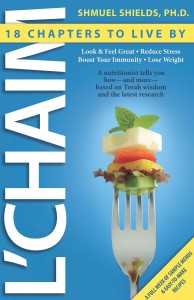L’Chaim: 18 Chapters to Live By
 L’Chaim: 18 Chapters to Live By
L’Chaim: 18 Chapters to Live By
By Shmuel Shields, PhD
Brand Name Publishing
Jerusalem, 2012
228 pages
Reviewed by Shira Isenberg
Few nutrition and health books are written for a frum audience, factoring in the unique aspects of our lifestyle, like Shabbat and yom tov foods—and not for lack of need. With L’Chaim: 18 Chapters to Live By, Dr. Shmuel Shields, a nutritionist with twenty-five years of experience and a health educator trained in both Eastern and Western health modalities, fills this void with an overview of healthy frum living in a well-organized, easy-to-read format. Opening with fundamental principles that apply to the overall diet—like the benefits of eating colorful foods and how to eat balanced meals—the book then goes on to cover specific topics in each chapter, such as fats, protein and exercise.
Some of the basic material covered is well-known, especially if you have a working knowledge of nutrition, but Dr. Shields also highlights problems that readers may not be aware of, such as the relationship between insufficient sleep and weight gain. (People who sleep less are more likely to be obese, struggle with hunger and engage in late-night snacking.) In addition, he poses questions to which some readers may think they know the answer but don’t, such as “What is a Balanced Meal?” (a meal that is half vegetables, a quarter whole-grain carbs and a quarter lean protein) or “What is a Whole Food?” (a minimally processed food). Additionally, he bursts some established nutrition myths, such as viewing eggs as a “cholesterol-raising villain.” Despite its high cholesterol content, one egg only contains about 1.5 grams of saturated fat and can be safely consumed by most people on a daily basis.
Readers will find the menu plan and recipes—including a Mediterranean-style cholent made with turkey, plenty of beans and eggplant and zucchini—useful for meal planning. In addition, a number of chapters end with practical takeaway tips. The book would be more valuable still if there were takeaway tips after every chapter.
I was especially pleased to see the author’s tips on choosing vitamin and mineral supplements (end of Chapter 12), which provide much-needed guidance on a subject matter that is riddled with misinformation. Another bonus is the chapter on immunity, a topic not usually addressed in nutrition books.
What may attract frum readers in particular is the way Dr. Shields interweaves lore from the Torah and Chazal into the book. For example, in discussing the connection between heart function and emotional health, Dr. Shields warns, “In particular, do all you can to refrain from anger. As it says in Kohelet (11:10), ‘Rather, banish anger from your heart.’ This threatening emotion raises blood pressure, thickens the blood and constricts blood vessels, all of which raise the chances of clot formation and heart attack.” Dr. Shields appeals not only to the medical or rational argument, but he also offers a spiritual or religious obligation to be healthy.
To motivate readers, Dr. Shields intersperses stories amidst the facts and research, though one may marvel at the amazing compliance of his patients! They always seem to do exactly what he tells them without a struggle. (Obviously all stories are anonymous.) It might have been helpful (and more realistic) to include a story or two about a non-compliant patient or one who experienced a setback or didn’t see the desired results. Nonetheless, Dr. Shields’ judicious “slow-and-steady” approach to making lifestyle changes, which he advocates throughout the book, is quite realistic.
In the chapter on heart health, Dr. Shields briefly mentions an alternative remedy for cardiac problems called ionized water. He goes on to share a worrisome story in which the protagonist, a rabbi with a heart condition, secretly takes himself off medication without telling his doctor and switches to ionized water. Aside from the fact that I was unable to find solid evidence in mainstream health literature of ionized water’s benefits, stopping to take medication without the advice of one’s doctor can be life-threatening.
This book is not a heavy read, but because of the dense information included, you might want to break it down and read one chapter at a time. For instance, the weight management chapter covers portion sizes, whole grains, goal setting, the importance of breakfast and emotional eating, among other topics, all very briefly. It would have been great to see more development of each of these vital components of the weight management picture, with perhaps some hands-on tools, but we cannot expect an exhaustive treatment of every topic. As a result, L’Chaim may be more useful as a reference tool or as a way to identify areas for improvement.
I applaud Dr. Shields’ call-to-action for community-wide changes toward a healthier lifestyle, especially as they pertain to communal affairs like shul kiddushim on Shabbat. The publication of this book is indeed a step in the right direction.
Shira Isenberg is a registered dietitian and writer with a private nutrition practice in Nashville, Tennessee. She has a master’s degree in public health nutrition from Hunter College in New York.
